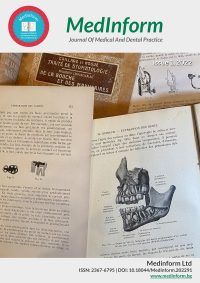Issue One 2022
2022, Vol. 9, issue 1, (June)
Original Article
Аntibacterial effect of irrigants and medications for temporary dressing on Enterococcus faecalis
Abstract:
Summary: The main etiological factor for the development of the apical periodontitis is the microbial infection. Enterococcus faecalis is the microorganism most commonly found in asymptomatic, persistent endodontic infections. An important goal of the endodontic treatment is the removal of pathogenic microorganisms or reduction to levels compatible with the healing process. Objective: The study was conducted to thoroughly investigate the benefits of the various medications used for irrigation and temporary dressing against the most common pathogen in teeth with chronic apical periodontitis, namely Enterococcus faecalis. Materials and methods: The study included 61 teeth diagnosed with chronic apical periodontitis. 31 of them are subject to one-visit treatment, white the remaining 30 – a multi-visits treatment. A Microbiological examination was performed before the treatment of the root canals and immediately after their preparation. In the case of multi-visits treatment, the last sample was taken after application and response to the intracanal medicaments used as a temporary dressing. In the presence of an old root canal obturation, the first microbiological sample was taken immediately after removal of the obturation.
Results: A relatively large proportion of the microbiological studies revealed the presence of Enterococcus faecalis in the root canals before mechanical and chemical treatment. A relatively large proportion of the re-examination after root canal treatment did not detect the presence of pathogenic microorganisms.
Conclusion: In our study we prove that adequate isolation of the operative field, proper mechanical and chemical treatment, including only EDTA, sodium hypochlorite 5.25% and saline (distilled water), are sufficient to control infection and reduce microorganisms (Ent.faecalis, C .albicans, E.coli, Pseudomonas aeruginosa) in the root canal system.
Authors:
Denitsa Zaneva-Hristova; Department of Conservative Dentistry and Oral Pathology, Faculty of Dental Medicine, Medical University of Varna;Tsvetelina Borisova-Papancheva; Department of Conservative Dentistry and Oral Pathology, Faculty of Dental Medicine, Medical University of Varna;

